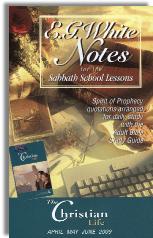|
||||||||||||||
Commentary on "Love"
Day 4: Tuesday, March 31, 2009
Today’s lesson explores the author’s understanding of the New Testament’s revelation of God’s love. He asks why Jesus Christ came into the world, why He suffered, and why He died. Moreover, he asks why the “sin problem” has not yet been fully dealt with, and he concludes that “we are in no position to answer these questions.”
“Being a holy God,” he writes, “He could not overlook the rebellion against His perfect law; being love, He could not stand back and let His creatures perish without doing His utmost to save them.”
Following the opening questions, the author state, “In His infinite wisdom God devised a plan to deal with the predicament of sin in the best possible way.”
There follows a quotation ending with these words by Donald G. Bloesch: “God’s wrath is provision whereas his love is eternal.”
Then the lesson asks what these six things tell us about the New Testament message of God’s love: God’s gift of His Son, the Son’s giving of Himself; the gift of the Holy Spirit, the availability of spiritual gifts, the certainty of salvation, and an eternal future n an environment of love.” It ends with the thought questions, “How do the three angels’ messages of Revelation 14: 6-12 fit in this overall New Testament theme of divine love? Ellen White speaks about the message of the third angel as the good news of justification by faith “in verity”. How does that all fit in with the theme of God’s love for humanity?
Problems
First, the book of Hebrews, especially chapter 9, overtly states that “the law requires that nearly everything be cleansed with blood, and without the shedding of blood there is no forgiveness” (Hebrews 9:22). Verse 12 says, “He did not enter by means of the blood of goats and calves; but he entered the Most Holy Place once for all by his own blood, having obtained eternal redemption.”
Moreover, John 3:16 explains why Jesus came into the world: He came so that all who believe in Him will have eternal life.
The Bible is explicit that there was no other way for sin to be atoned. The author’s statement that we cannot answer these questions contradicts the Bible’s clear statements.
Furthermore, the assertion that “God devised a plan to deal with the predicament of sin in the best possible way” creates the impression that God scrambled to find a fix for sin after Adam and Eve fell. God found Himself and His creation in a predicament, and He came up with the best solution for an overwhelming problem.
Yet Revelation 13:8 is clear that all those whose names are written in the book of life of the Lamb that was slain were we there since “before the foundation of the world”. God knew BEFORE He created the world who would be in the book of life, and that book belonged, before the foundation of the world, to the Lamb who was slain.
God sending His Son was not an afterthought; it was a premeditated and decided plan that was in place even before God created the world.
Moreover, the issue of sin was not “rebellion against His perfect law”. Adam and Eve did not sin against the law; they sinned against God Himself. The only “law” they had was the law commanding them not to eat from the tree of the knowledge of good and evil (Genesis 2:16-17). They deliberately broke that command by refusing to trust God when confronted with a rational-sounding argument. Instead of trusting that God told them the truth and honoring His word, they chose instead to analyze and discuss His word, and they betrayed God by analyzing instead of obeying His word.
Their sin was not rebellion against God’s law. There is no biblical indication that they rebelled against God’s law. What the story does tell, however, is that they chose to listen to deception and to give credence to a voice other than God’s.
Their sin was far more serious than rebellion against God’s law. Adam and Eve chose deliberately to sin against God, acting outside of faith and trusting a creature rather than their Creator. The law was not an issue in this first sin. The creatures’ faith and trust in their Creator was the issue.
Additionally, the Bloesch quotation that God’s wrath is provisional whereas His love is eternal, while quoted out of context, again suggests a concept not stated in the Bible. Jesus Himself said that those the Lord Jesus “never knew” would be sent into eternal punishment (Matt 7:23; Matt 25:41).
Finally, the reference to the “three angels’ messages of Revelation 14:6-7”is presumptuous. Adventists claim that the third angels’ message is a call to properly worship God by Sabbath-keeping. The actual text in Revelation says no such thing. The Adventist interpretation of Revelation 14:6-12 leaves people in bondage to a false doctrine. Sabbath-keeping has no place as a test in believers’ lives. Never does the Bible suggest such a thing; only by twisting Scriptures to fit that assumption can one come up with justification for the argument.
Summary
- We do know, contrary to the authors statement, why Jesus had to die. God required that blood be shed for the remission of sin. No one but God, the Creator, could have assumed the responsibility for the sin of the world.
- God did not “devise” a plan to deal with sin in the best possible way. On the contrary, God had Jesus’ death in place from eternity, and the names of those who would be saved were already written in the Lamb’s book of life before creation.
- Adam and Eve did not rebel against “God’s perfect law”. Rather, they sinned against God, choosing to analyze and question His word ad to engage in intellectual sparring with a deceiver instead of acting in trust and obedience to God their Creator.
- The “third angels’ message” as Adventists teach it is not supported by Revelation 14:6-12. Never is Sabbath mentioned as a test of belief for those who love God.
Copyright 2008 BibleStudiesForAdventists.com. All rights reserved. Revised March 31, 2009. This website is published by Life Assurance Ministries, Glendale, Arizona, USA, the publisher of Proclamation! Magazine. Contact email: BibleStudiesForAdventists@gmail.com.
The Sabbath School Bible Study Guide and the corresponding E.G. White Notes are published by Pacific Press Publishing Association, which is owned and operated by the Seventh-day Adventist church. The current quarter's editions are pictured above.
Official Adventist Resources
Standard Edition Study Guide Week 1
Teacher's Edition Study Guide Week 1
Easy Reading Edition Study Guide Week 1
Search the Complete Published Ellen G. White Writings


